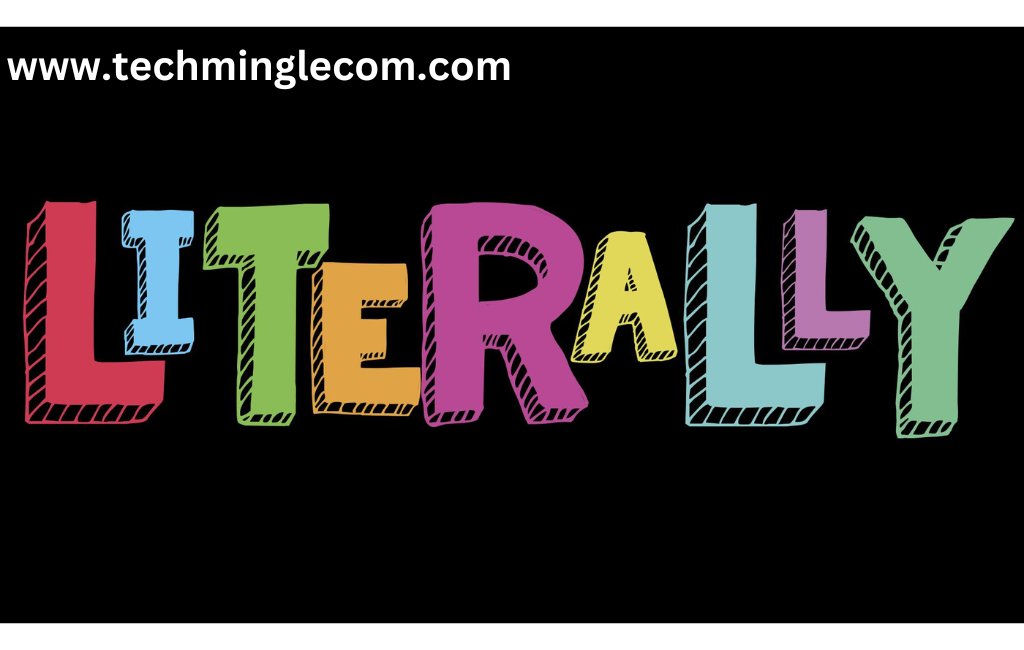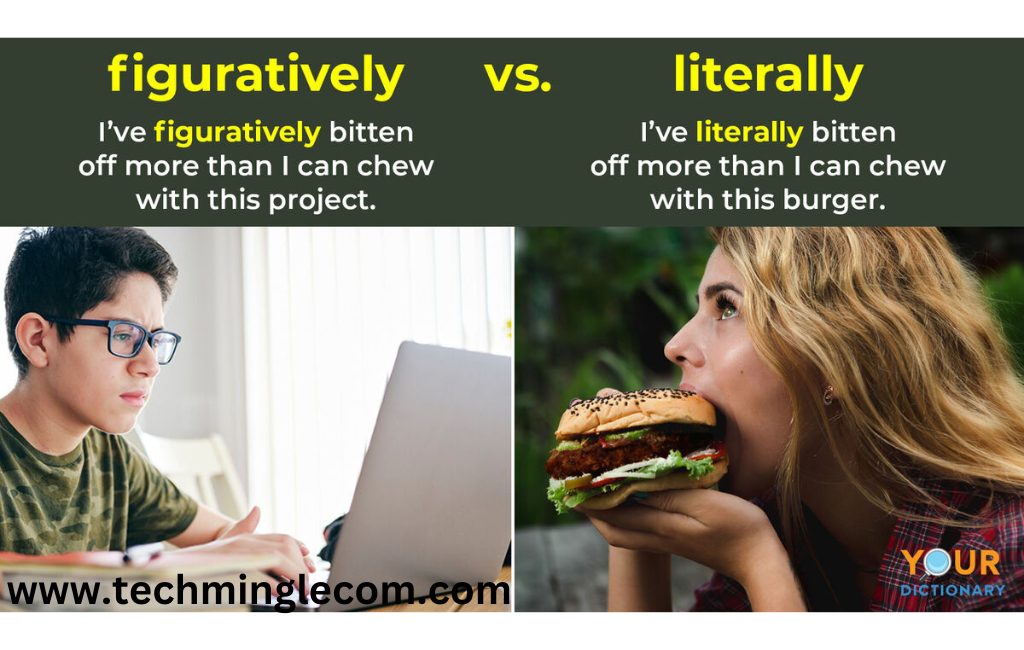
Literally:100% Understanding the Fine Line
Introduction to Literally
Have you ever heard someone say, “I’m literally starving,” even though you know they had breakfast just a few hours ago? The word “literally” is one of the most frequently misused words in the English language, often causing confusion and sometimes even amusement. But what does “literally” really mean, and why is it so commonly misused?
What Does “Literally” Mean?
At its core, “literally” means “in a literal manner” or “exactly as stated.” It is used to describe something that is true to fact and not exaggerated. For instance, if you say, “I literally ran five miles,” it means you actually ran that distance.

Why is “Literally” Often Misused?
The misuse of “literally” often stems from a desire to add emphasis to a statement. People use it to stress the intensity of their feelings or experiences, even when what they are describing is not literally true. This hyperbolic usage has become so widespread that it has started to blur the lines between literal and figurative language.
History and Evolution
Origin of the Word
The word “literally” comes from the Latin word “litera,” meaning “letter.” It was first used in the English language in the early 16th century, retaining its original meaning of “in a literal sense.”
Historical Usage
Initially, “literally” was used exclusively to indicate factual accuracy.Authors and speakers used it to clarify that their statements should be taken at face value.
Evolution of Meaning Over Time
Over the centuries, the meaning of “literally” has evolved. By the 18th century, writers began to use it for emphasis, sometimes in a figurative sense. This trend has continued into modern times, leading to the current confusion over its proper usage.
Common Misuse

Examples in Everyday Speech
You might hear someone say, “I literally died laughing,” when they find something extremely funny. Clearly, the speaker did not actually die, but they use “literally” to emphasize their reaction.
Impact on Communication
This kind of misuse can lead to misunderstandings, especially in written communication where tone and context might not be as clear. It can also dilute the impact of the word when it is used correctly.
Famous Misuses in Media
Public figures and celebrities often misuse “literally,” which can amplify the confusion. For example, a well-known TV host once said, “This is literally the best day of my life,” on multiple occasions, making the statement lose its intended impact.
Literally vs. Figuratively

Definitions and Differences
“Literally” refers to something that is factually true, while “figuratively” describes something in a metaphorical or symbolic sense. For example, “He is literally a giant” means the person is actually very tall, whereas “He is figuratively a giant” means the person is great or impressive in some way.
How to Use Each Correctly
Using “literally” correctly requires you to stick to its original meaning. Reserve it for situations where no exaggeration or metaphor is involved. Use “figuratively” when you want to describe something in a non-literal, metaphorical way.
Common Pitfalls
A common mistake is using “literally” when “figuratively” is intended.This can mislead your audience and diminish the strength of your message
Why “Literally” is Important
Precision in Language
Using “literally” correctly ensures precision in language. When you say something is “literally” true, your audience understands that there is no exaggeration or metaphor involved. This clarity is essential for effective communication, especially in professional and academic settings where accuracy is paramount.
Avoiding Ambiguity
Ambiguity in communication can lead to misunderstandings, mistakes, and even conflicts. By using “literally” correctly, you help to eliminate potential confusion. When your words are taken at face value, your message is clear and unambiguous, making it easier for others to understand and act on your information.
Enhancing Clarity in Communication
Effective communication is crucial in both personal and professional settings.Whether you’re giving instructions, sharing a story, or making an argument, using “literall,y” correctly can enhance the clarity of your message. When your audience knows that you mean exactly what you say, your communication becomes more effective and trustworthy.
Using “literally” accurately also improves your credibility as a speaker or writer. It demonstrates your attention to detail and respect for language, which can enhance your reputation and influence. In a world where words can be easily misunderstood, maintaining the integrity of words like “literall,y” helps to preserve the richness and precision of the English language.
Literally in Literature
Usage by Famous Authors
Many famous authors have used “literall,y” to great effect in their works. Charles Dickens, for instance, wrote, “He literally feasted his eyes in silence” to emphasize the character’s intense gaze.
Literary Devices and “Literally”
In literature, “literall,y” can be a powerful tool when used sparingly. It can add emphasis and clarity to a narrative, helping readers understand the precise nature of an event or action.
Impact on Storytelling
When used correctly, “literally” can enhance storytelling by providing exact descriptions. It helps readers visualize scenes and understand characters’ experiences more vividly.
Literally in Popular Culture
Movies and TV Shows
“Literally” is often used in dialogue to emphasize characters’ emotions. For example, a character might say, “I literally can’t believe it,” to convey extreme surprise.
Memes and Social Media
The misuse of “literally” has become a popular subject for memes and social media posts. These often highlight the humorous side of incorrect usage.
Songs and Lyrics
Songwriters sometimes use “literall,y” to add emphasis to their lyrics, though this can lead to the same issues of misuse and confusion.
The Linguistic Debate
Prescriptivists vs. Descriptivists
Linguists are divided on the evolving usage of “literall,y.” Prescriptivists argue for maintaining its original meaning, while descriptivists accept its modern, hyperbolic use as part of language evolution.
Arguments For and Against Changing Meanings
Supporters of the traditional meaning believe it preserves clarity and precision. Those in favor of modern usage argue that language is constantly evolving and should reflect current communication styles.
The Role of Dictionaries
Dictionaries have started to include the hyperbolic meaning of “literall,y,” acknowledging its widespread use. This reflects the dynamic nature of language but also fuels the debate.
Regional Variations
Differences in Usage Across English-Speaking Countries
Usage of “literall,y” can vary by region. In the UK, for instance, people might use it more conservatively, while in the US, the hyperbolic use is more common.
Cultural Influences on the Word
Cultural factors influence how “literall,y” is used. Media, education, and regional dialects all play a role in shaping its meaning and usage.
The Future of “Literally”
Predicted Trends in Usage
The word “literall,y” is likely to continue evolving, especially with the influence of digital communication and social media. As more people use “literall,y” for emphasis rather than its original meaning, dictionaries and language guides might further acknowledge this dual usage. This shift reflects the dynamic nature of language and how it adapts to contemporary communication styles.
Potential Changes in Meaning
As “literall,y” becomes more entrenched in its hyperbolic sense, its original meaning may become less prominent. Future generations might primarily understand “literall,y” as an intensifier rather than a strict descriptor of fact. This change could lead to the development of new words or phrases to fill the gap left by “literall,y” in its original sense.
Influence of Digital Communication
Digital communication, with its fast-paced and informal nature, is a major driver of linguistic change. Platforms like Twitter, Instagram, and TikTok, where brevity and impact are key, often favor exaggerated expressions. Emojis, memes, and other digital tools may further blur the lines between literal and figurative language. As a result, the way we use and understand “literall,y” will likely continue to be shaped by these digital influences.
In the future, the use of “literall,y” might become more context-dependent. In formal writing and professional settings, its traditional meaning may still be preferred to maintain clarity and precision. In casual conversation and digital media, however, its hyperbolic usage could dominate. Understanding these nuances will be crucial for effective communication in an ever-changing linguistic landscape.
How to Use “Literally” Correctly
Tips and Guidelines
Stick to Facts:
Use “literall,y” only when describing something that is factually true.
Avoid Hyperbole:
Resist the urge to use “literall,y” for emphasis unless it is accurate.
Check Context:
Ensure the context of your sentence supports the literal meaning.
Common Mistakes to Avoid
Using “literall,y” for figurative expressions:
Avoid saying things like “I’m literall,y on fire” unless you mean it literall,y.
Overusing “literall,y”:
Use it sparingly to maintain its impact.
Practice Exercises
Identify Correct Usage:
Read sentences and decide if “literall,y” is used correctly.
Rewrite Sentences:
Take hyperbolic uses of “literall,y” and rewrite them with correct usage.
FAQs about “Literally”
What is the correct way to use “literall,y”?
Use it to describe something that is factually accurate and not exaggerated.
Can “literall,y” be used for emphasis?
It is often used this way, but it is not the correct usage. It should only emphasize factual statements.
How has the meaning of “literall,y” changed over time?
It has evolved from a strict factual meaning to include a hyperbolic sense for emphasis.
Why do people misuse “literall,”?
People often misuse it to add emphasis to their statements, despite it being incorrect.
Is it wrong to use “literall,y” in a figurative sense?
While commonly done, it can lead to confusion and is generally considered incorrect.


